#Schizophrenia
Text
Happy lesbian visibility week to every lesbian with schizophrenia! Happy lesbian visibility week to every lesbian with schizoaffective disorder! Happy lesbian visibility week to every lesbian with schizoid personality disorder! Happy lesbian visibility week to every lesbian with schizotypal personality disorder! Happy lesbian visibility week to every lesbian with paranoid personality disorder! Happy lesbian visibility week to every lesbian with delusional disorder! Happy lesbian visibility week to every lesbian who has ever experienced psychosis!
I love you all, happy visibility week! 🧡🤍🩷
#lesbian visibility week#schizophrenia#schizoaffetive disorder#schizoid personality disorder#schizotypal personality disorder#paranoid personality disorder#delusional disorder#psychosis
234 notes
·
View notes
Text
#aizawa shouta#true#adult model#egyptology#jaemin#geralt x reader#schizophrenia#kuroshitsuji#wood#dsmp au
121 notes
·
View notes
Text
They say I'm not my illness
But where do I stop and it begin?
Who am I without it and who would I have been if I never got sick?
They try to erase it from my mind... but like a tree and its leaves there is no separation.
#psychosis#schizophrenia#psychotic#psychotic break#schizophrenic spectrum#mental illness#schizo spectrum#schizoaffective#psychiatry
52 notes
·
View notes
Text
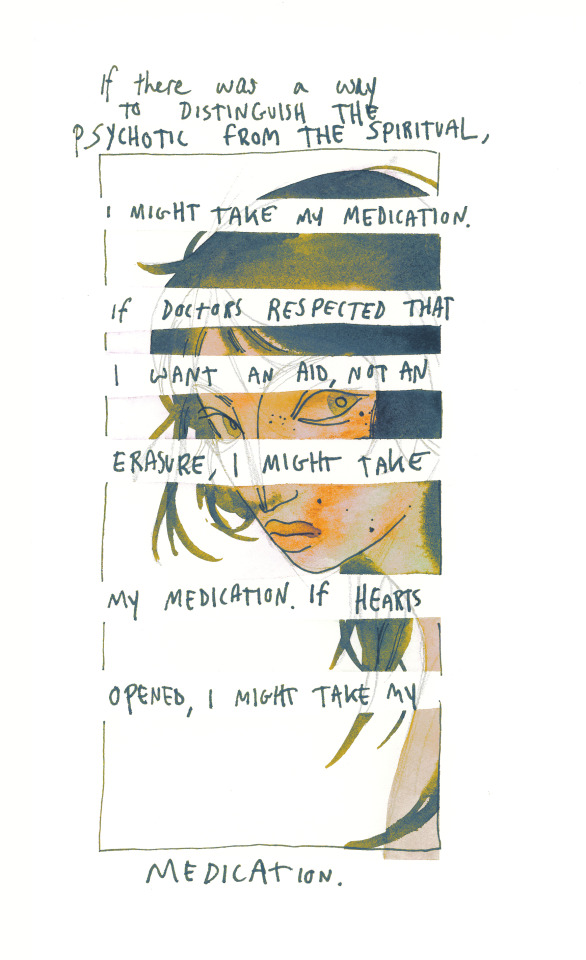


a little diary about trying to find a middle ground between being spiritual and being a schizophrenic
4K notes
·
View notes
Text
hey fun fact did you know that if you're on the schizophrenia spectrum, have psychosis, have psychotic symptoms or traits, etc, that you're loved and your symptoms and traits should not be vilainized or seen as evil or ugly?
#sam.txt#sam.neuro#psychosis#schizospec#schizophrenia spectrum#schizophrenia#szpd#stpd#neurodivergent#schizoid personality disorder#schizotypal personality disorder#schizoaffective#nd#persodivergent#interdivergent#positivity
25K notes
·
View notes
Text
it's never too late to start brushing your teeth again. i basically never brushed my teeth for a whole 10 years. a decade. A DECADE. i still struggle to brush my teeth once a week, but it all started with brushing my teeth once every few months. so i mean it when i say brushing your teeth once a week, a month, a year, or even a decade, is better than nothing.
and still, nothing is not shameful. it is not immoral to struggle with self care. and it is also not pointless to keep trying. anything you can do, even if its wiping plaque off with a towel, is enough. it is good to take care of yourself however you can, even if it's just trying to muster the will to. reading this post is good, too.
i believe in you and i am proud of you, even in the smallest of steps. it's okay. you can give yourself grace.
#softspoonie#disabled#disability#schizophrenic#schizophrenia#schizoaffective#depression#depressed#severe depression#self care#hygiene#self love#self help#mentally ill#mental health#physical health#chronic illness#chronically ill#mental illness#mental health support#spoonie#spoonie positivity#disability positivity#neurodivergent#adhd#neurodivergent positivity#disabled positivity
24K notes
·
View notes
Text
fuck it. shout out to "high functioning" neurodivergents
the ones who can mask easily, the ones who can get social cues, the ones who have managed to go most of their life not even knowing they were ND because they didn't present as the stereotypical ND person.
the ones who can pay attention in class, understand social etiquette, who understand societial expectations
the ones who don't feel neurodivergent enough bc they don't struggle in the same ways/areas a lot of NDs do, or they can't relate to other NDs' experiences because they always understood these things easily
the ones with high empathy, the ones who DO get the joke, the ones who are constantly told that they can't possibly be neurodivergent because they don't act like what you'd expect a neurodivergent person to act like.
you are neurodivergent enough. you are valid, and so are your experiences. not struggling as much as others do in some places doesn't mean you dont struggle at all. your condition and diagnosis is valid. your symptoms are valid. YOU ARE VALID. not checking all the supposed boxes doesn't mean you aren't neurodivergent. you are enough. you are valid. you are loved. you are valued. you matter. you belong in neurodivergent spaces, you deserve to use whatever resources are available to you, you are allowed to take up space in these communities. and i am so, so proud of you.
feel free to, and actually, i encourage you to reblog this with your experiences. we belong in this community as much as anyone else. please also tag this w/ any neurodivergent conditions i may have forgotten 💙
since this is getting lots of notes I'd like to add, even if you're undiagnosed or maybe self diagnosed, for whatever reason, (i.e. can't get access to a diagnosis, not being taken seriously, or just not wanting an official diagnosis, etc.) this still applies to you. actually especially to you folks. don't think for a second you're not valid just bc you don't have the paperwork or whatever to say it
#neurodivergent#neurodiversity#nd#autism#adhd#ocd#dyslexia#dyscalculia#asd#autism spectrum disorder#tourettes#tourettes syndrome#dyspraxia#hyperlexia#synesthesia#down syndrome#sensory processing disorder#schizophrenia#borderline personality disorder#bpd
8K notes
·
View notes
Text
poor memory is a huge deal and i wish people wouldn't diminish it by saying "oh yeah i can't remember what i had for breakfast lol."
i can't remember the first 10 years of my life. i can't remember entire days, weeks, months at a time. i can't remember entire people, i can't remember names or faces. i can't remember when things are scheduled for, my calendar app on my phone is booked to the max with reminders and task checklists. i can't remember when i moved into what home when, i can't remember important milestone dates like when i got or lost certain jobs, or when i started a new hobby.
that's what i mean when i say i have poor memory. poor memory is so scary for the person who has it. it's not a quirky thing, everyone forgets small details. memory problems are scary because you can go through entire events or days with no memory, or plan for things in the future that you can't recall ever even looking into or scheduling. it's not a funny haha kind of thing, it's serious, and it affects a lot of people in very unavoidable ways.
not being able to plan for appointments or work schedules, not being able to remember people's names or faces, not being able to recall whether or not you were present for something or whether or not you met someone, not being able to keep track of what's happening on what dates and losing track of items because you can't remember where you put them are all very real problems, and anyone dealing with them deserves to be taken seriously, and not diminished when they choose to speak up about it.
#neurodivergence#mental health#adhd#did#ptsd#mental illness#schizophrenia#ocd#anxiety#generalized anxiety disorder#depression#bipolar disorder#bpd#borderline personality disorder#neurodivergent#autism#mental health awareness#dpdr#osdd#dissociative disorders#dissociative#depersonalization derealization#other specified dissociative disorder#memory problems#poor memory#learning disorders#chronic fatigue#neurological disability#neurological disorders#traumatic brain injury
7K notes
·
View notes
Text
There’s nothing inherently “scary” about someone talking to themself in public.
There’s nothing “scary” about someone rocking back and forth in public.
There’s nothing “scary” about someone pacing back and forth in public.
Some of y’all are just ableist.
#Disability#Disabled#Multiply Disabled#Disabilities#Disability Rights#Disability Justice#Schizophrenia#Actually Schizophrenic#Autistic#Autism#Actually Autistic#Psychosis#Psychotic#Psychosis Awareness#Schizophrenia Awareness#Neurodivergent#Neurodiversity#Neurodiverse#Autism Awareness#Mad Liberation#Mental Illness#Mental Illnesses#Mentally Ill#Disability Awareness#Mental Health#Mental Health Awareness#Anti Ableism#Anti Ableist
5K notes
·
View notes
Text
Things I'd love for the Internet to leave in 2023:
• misusing the word "delusional" or saying "delulu"
• public freakout videos that are just someone displaying psychotic symptoms
• "I'm in your walls" and other paranoia triggering "jokes"
• schizoposting
• misusing the word "psychotic"
• baiting and triggering people online who are openly psychotic or displaying psychotic symptoms
• excluding schizo-spec and psychotic people from any neurodiversity/mental illness awareness
Let's just all try to be better to schizo-spec and psychotic people. And hold others accountable as well.
#2024#new years eve#tw im in your walls#tw paranoia#mental illness#nd#schizophrenia#neurodivergent#schizophrenic#psychosis#actuallyschizophrenic#mental health awareness#pseriouslypsychotic#schizo-spec
27K notes
·
View notes
Text
If you advocate for mental health awareness, but joke about things like intrusive thoughts and schizophrenia, think it’s disgusting and lazy when people who are depressed can’t do things like showering or cleaning their room, use terms like “narcissistic abuse”, and believe that having ASPD, BPD, or NPD makes someone a bad person, you are not a mental health advocate. You don’t actually care about helping people or de-stigmatizing mental illness, you just want to make yourself feel like you do. You can’t pick and choose what disorders and symptoms are acceptable, and which ones make someone a bad person. Either you support everyone, or you support no one.
and if you’re neurodivergent/mentally ill and you do any of those things, you are part of the problem. there’s no such thing as “good/moral” disorders, or “bad/immoral” disorders. We all need to have each other’s backs.
#mental health#mental illness#tw abelism#npd safe#bpd#npd#aspd safe#aspd#ocd#schizophrenia#cluster b#neurodivergent
4K notes
·
View notes
Text
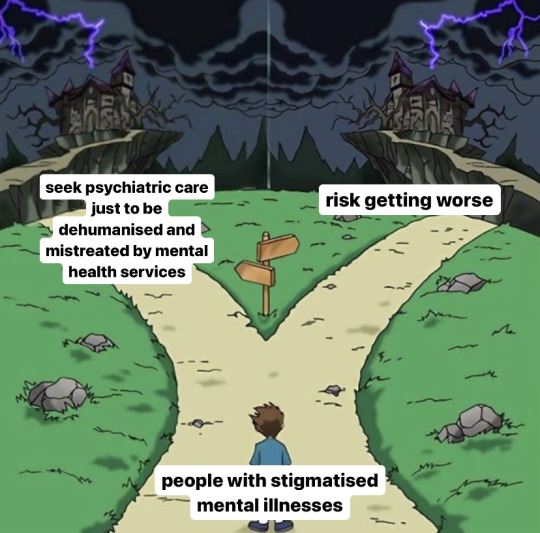
my anhedonia is eating me alive so i’m making these mental illness memes to cope
#actually aspd#actually npd#aspd#npd#clusterb#actually mentally ill#actually bpd#actuallyaspd#actuallynpd#cluster b#bpd#actuallybpd#actually schizophrenic#actually delusional#actually borderline#actually obsessive#actually autistic#actually antisocial#actually narcissistic#schizophrenia#schizospec#psychotic spectrum#did#osdd#ocd#actually pocd#mental illness#cluster b personality disorder#cluster b memes#npd meme
2K notes
·
View notes
Text
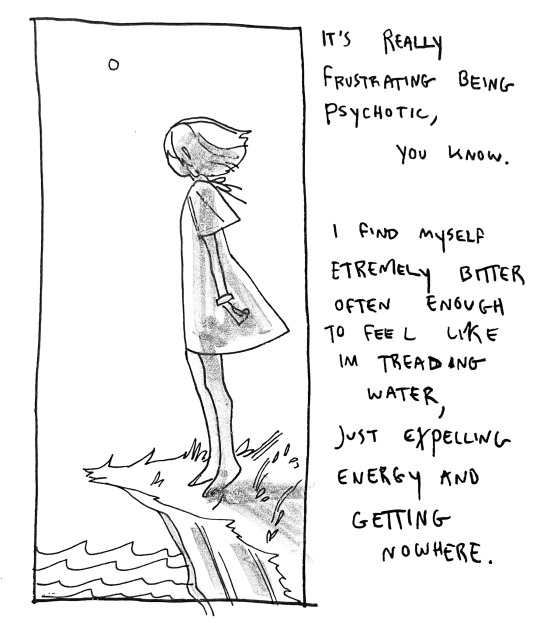
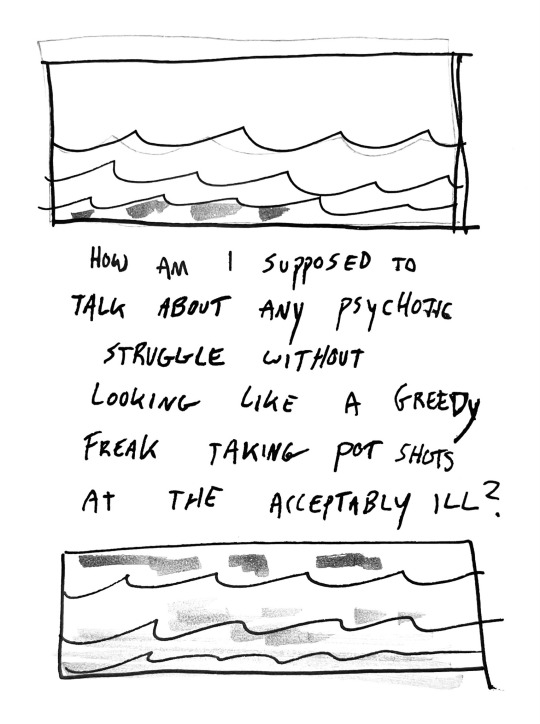

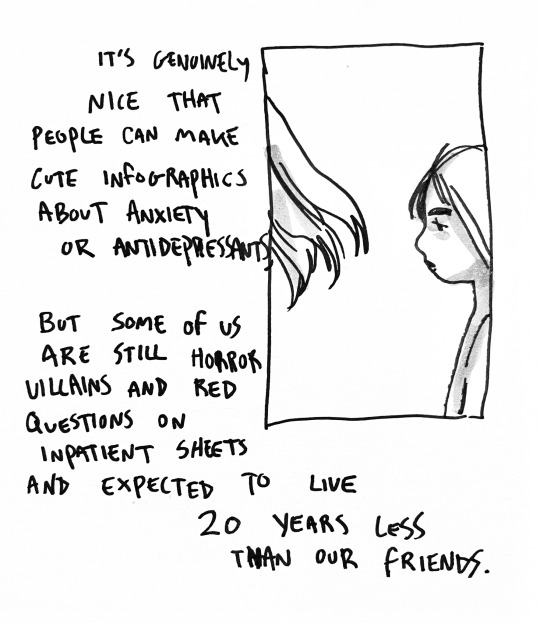

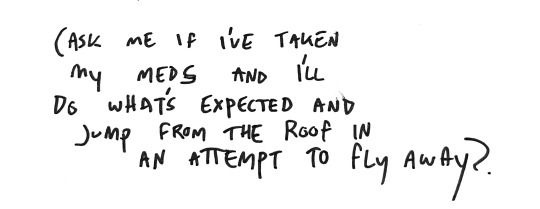
Ramblings about schizophrenia
11K notes
·
View notes
Text
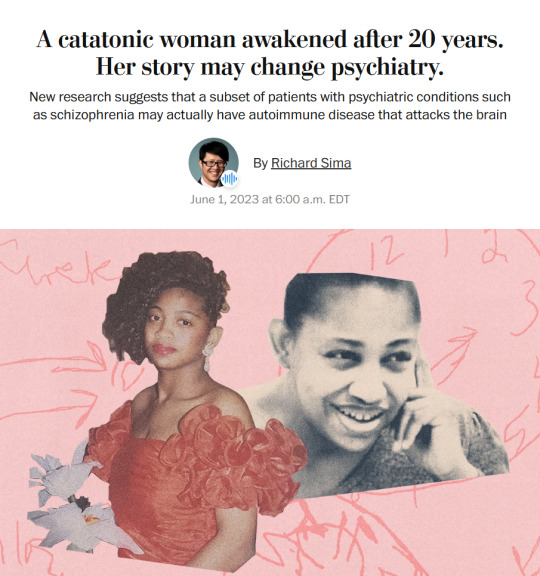
Story from the Washington Post here, non-paywall version here.
Washington Post stop blocking linksharing and shit challenge.
"The young woman was catatonic, stuck at the nurses’ station — unmoving, unblinking and unknowing of where or who she was.
Her name was April Burrell.
Before she became a patient, April had been an outgoing, straight-A student majoring in accounting at the University of Maryland Eastern Shore. But after a traumatic event when she was 21, April suddenly developed psychosis and became lost in a constant state of visual and auditory hallucinations. The former high school valedictorian could no longer communicate, bathe or take care of herself.
April was diagnosed with a severe form of schizophrenia, an often devastating mental illness that affects approximately 1 percent of the global population and can drastically impair how patients behave and perceive reality.
“She was the first person I ever saw as a patient,” said Sander Markx, director of precision psychiatry at Columbia University, who was still a medical student in 2000 when he first encountered April. “She is, to this day, the sickest patient I’ve ever seen.” ...
It would be nearly two decades before their paths crossed again. But in 2018, another chance encounter led to several medical discoveries...
Markx and his colleagues discovered that although April’s illness was clinically indistinguishable from schizophrenia, she also had lupus, an underlying and treatable autoimmune condition that was attacking her brain.
After months of targeted treatments [for lupus] — and more than two decades trapped in her mind — April woke up.
The awakening of April — and the successful treatment of other people with similar conditions — now stand to transform care for some of psychiatry’s sickest patients, many of whom are languishing in mental institutions.
Researchers working with the New York state mental health-care system have identified about 200 patients with autoimmune diseases, some institutionalized for years, who may be helped by the discovery.
And scientists around the world, including Germany and Britain, are conducting similar research, finding that underlying autoimmune and inflammatory processes may be more common in patients with a variety of psychiatric syndromes than previously believed.
Although the current research probably will help only a small subset of patients, the impact of the work is already beginning to reshape the practice of psychiatry and the way many cases of mental illness are diagnosed and treated.
“These are the forgotten souls,” said Markx. “We’re not just improving the lives of these people, but we’re bringing them back from a place that I didn’t think they could come back from.” ...
Waking up after two decades
The medical team set to work counteracting April’s rampaging immune system and started April on an intensive immunotherapy treatment for neuropsychiatric lupus...
The regimen is grueling, requiring a month-long break between each of the six rounds to allow the immune system to recover. But April started showing signs of improvement almost immediately...
A joyful reunion
“I’ve always wanted my sister to get back to who she was,” Guy Burrell said.
In 2020, April was deemed mentally competent to discharge herself from the psychiatric hospital where she had lived for nearly two decades, and she moved to a rehabilitation center...
Because of visiting restrictions related to covid, the family’s face-to-face reunion with April was delayed until last year. April’s brother, sister-in-law and their kids were finally able to visit her at a rehabilitation center, and the occasion was tearful and joyous.
“When she came in there, you would’ve thought she was a brand-new person,” Guy Burrell said. “She knew all of us, remembered different stuff from back when she was a child.” ...
The family felt as if they’d witnessed a miracle.
“She was hugging me, she was holding my hand,” Guy Burrell said. “You might as well have thrown a parade because we were so happy, because we hadn’t seen her like that in, like, forever.”
“It was like she came home,” Markx said. “We never thought that was possible.”
...After April’s unexpected recovery, the medical team put out an alert to the hospital system to identify any patients with antibody markers for autoimmune disease. A few months later, Anca Askanase, a rheumatologist and director of the Columbia Lupus Center,who had been on April’s treatment team, approached Markx. “I think we found our girl,” she said.
Bringing back Devine
When Devine Cruz was 9, she began to hear voices. At first, the voices fought with one another. But as she grew older, the voices would talk about her, [and over the years, things got worse].
For more than a decade, the young woman moved in and out of hospitals for treatment. Her symptoms included visual and auditory hallucinations, as well as delusions that prevented her from living a normal life.
Devine was eventually diagnosed with schizoaffective disorder, which can result in symptoms of both schizophrenia and bipolar disorder. She also was diagnosed with intellectual disability.
She was on a laundry list of drugs — two antipsychotic medications, lithium, clonazepam, Ativan and benztropine — that came with a litany of side effects but didn’t resolve all her symptoms...
She also had lupus, which she had been diagnosed with when she was about 14, although doctors had never made a connection between the disease and her mental health...
Last August, the medical team prescribed monthly immunosuppressive infusions of corticosteroids and chemotherapy drugs, a regime similar to what April had been given a few years prior. By October, there were already dramatic signs of improvement.
“She was like ‘Yeah, I gotta go,’” Markx said. “‘Like, I’ve been missing out.’”
After several treatments, Devine began developing awareness that the voices in her head were different from real voices, a sign that she was reconnecting with reality. She finished her sixth and final round of infusions in January.
In March, she was well enough to meet with a reporter. “I feel like I’m already better,” Devine said during a conversation in Markx’s office at the New York State Psychiatric Institute, where she was treated. “I feel myself being a person that I was supposed to be my whole entire life.” ...
Her recovery is remarkable for several reasons, her doctors said. The voices and visions have stopped. And she no longer meets the diagnostic criteria for either schizoaffective disorder or intellectual disability, Markx said...
Today, Devine lives with her mother and is leading a more active and engaged life. She helps her mother cook, goes to the grocery store and navigates public transportation to keep her appointments. She is even babysitting her siblings’ young children — listening to music, taking them to the park or watching “Frozen 2” — responsibilities her family never would have entrusted her with before her recovery.
Expanding the search for more patients
While it is likely that only a subset of people diagnosed with schizophrenia and psychotic disorders have an underlying autoimmune condition, Markx and other doctors believe there are probably many more patients whose psychiatric conditions are caused or exacerbated by autoimmune issues...
The cases of April and Devine also helped inspire the development of the SNF Center for Precision Psychiatry and Mental Health at Columbia, which was named for the Stavros Niarchos Foundation, which awarded it a $75 million grant in April. The goal of the center is to develop new treatments based on specific genetic and autoimmune causes of psychiatric illness, said Joseph Gogos, co-director of the SNF Center.
Markx said he has begun care and treatment on about 40 patients since the SNF Center opened. The SNF Center is working with the New York State Office of Mental Health, which oversees one of the largest public mental health systems in America, to conduct whole genome sequencing and autoimmunity screening on inpatients at long-term facilities.
For “the most disabled, the sickest of the sick, even if we can help just a small fraction of them, by doing these detailed analyses, that’s worth something,” said Thomas Smith, chief medical officer for the New York State Office of Mental Health. “You’re helping save someone’s life, get them out of the hospital, have them live in the community, go home.”
Discussions are underway to extend the search to the 20,000 outpatients in the New York state system as well. Serious psychiatric disorders, like schizophrenia, are more likely to be undertreated in underprivileged groups. And autoimmune disorders like lupus disproportionately affect women and people of color with more severity.
Changing psychiatric care
How many people ultimately will be helped by the research remains a subject of debate in the scientific community. But the research has spurred excitement about the potential to better understand what is going on in the brain during serious mental illness...
Emerging research has implicated inflammation and immunological dysfunction as potential players in a variety of neuropsychiatric conditions, including schizophrenia, depression and autism.
“It opens new treatment possibilities to patients that used to be treated very differently,” said Ludger Tebartz van Elst, a professor of psychiatry and psychotherapy at University Medical Clinic Freiburg in Germany.
In one study, published last year in Molecular Psychiatry, Tebartz van Elst and his colleagues identified 91 psychiatric patients with suspected autoimmune diseases, and reported that immunotherapies benefited the majority of them.
Belinda Lennox, head of the psychiatry department at the University of Oxford, is enrolling patients in clinical trials to test the effectiveness of immunotherapy for autoimmune psychosis patients.
As a result of the research, screenings for immunological markers in psychotic patients are already routine in Germany, where psychiatrists regularly collect samples from cerebrospinal fluid.
Markx is also doing similar screening with his patients. He believes highly sensitive and inexpensive blood tests to detect different antibodies should become part of the standard screening protocol for psychosis.
Also on the horizon: more targeted immunotherapy rather than current “sledgehammer approaches” that suppress the immune system on a broad level, said George Yancopoulos, the co-founder and president of the pharmaceutical company Regeneron.
“I think we’re at the dawn of a new era. This is just the beginning,” said Yancopoulos."
-via The Washington Post, June 1, 2023
#mental illness#schizophrenia#schizoaffective#psychotic disorders#psychology#neurology#autoimmune#autoimmine disease#neuroscience#medical news#medical research#catatonia#immunotherapy#immune system#clinical trials#good news#hope
6K notes
·
View notes
Text
i wish the world was a more gentle place to psychotic people
6K notes
·
View notes
